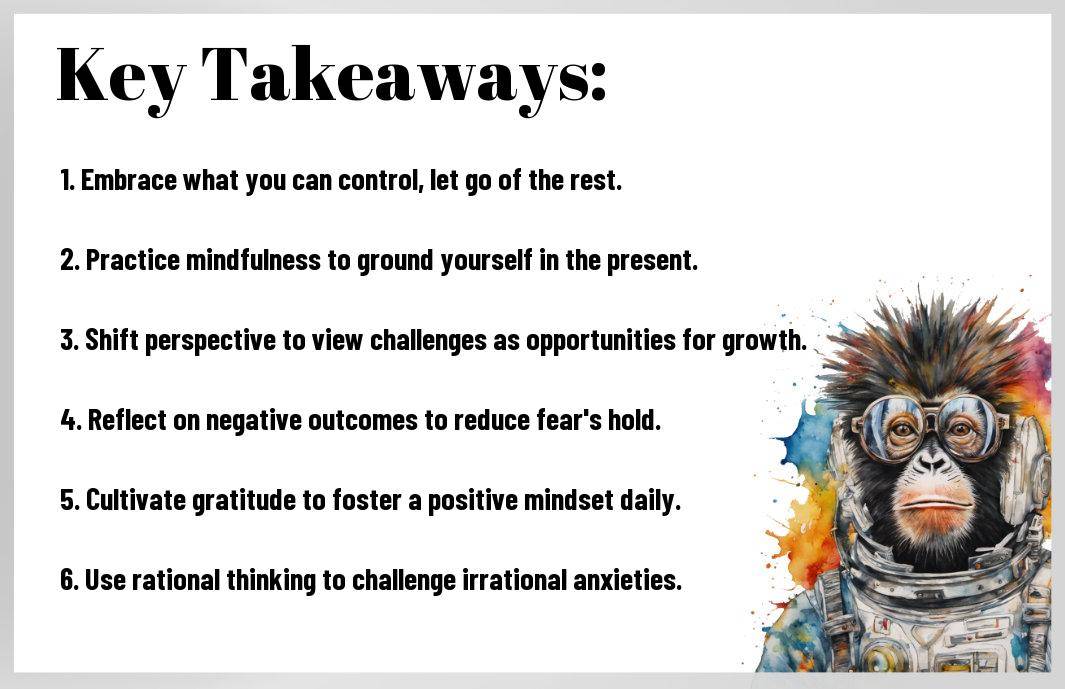
Newsletter Subscribe
Enter your email address below and subscribe to our newsletter

Enter your email address below and subscribe to our newsletter

There’s a wonderful way to tackle anxiety that you might not have considered: Stoic philosophy. I’ve found that by embracing the principles of Stoicism, I can shift my mindset and take charge of my thoughts. Instead of letting anxiety control me, I can apply the timeless wisdom of ancient philosophers to navigate life’s challenges more calmly. Together, we’ll explore how these Stoic teachings can help you find peace and resilience amidst your fears.


Anxiety is something that many of us experience at various points in our lives. It often manifests as a feeling of unease, worry, or fear about future events that might be uncertain or overwhelming. I’ve often found myself caught in a cycle of anxious thoughts that something might go wrong, leading to physical symptoms like a racing heart or sweating. It’s interesting how this natural human emotion can sometimes spiral into something more persistent and challenging to manage.
With anxiety, everyday tasks can feel daunting and even paralyzing at times. I have noticed how something as simple as attending a social gathering or meeting a deadline can trigger waves of stress and apprehension. You might find yourself overthinking situations, constantly doubting your capabilities, or avoiding activities altogether, which only adds to the feeling of isolation and frustration. Your ability to enjoy life, make connections, or simply be present in the moment can all be affected by how anxiety grips you.
This impact extends beyond just feeling nervous; it can seep into relationships, work, and your sense of self-worth. I’ve learned how even the smallest interactions can become sources of stress, leading to a cascade of negative feelings that can be hard to shake off. When I allowed anxiety to dictate my choices, I often found myself missing out on opportunities or experiences that I would have otherwise loved to engage in. Understanding how anxiety affects my daily life has been an important step in learning how to manage it effectively.

While exploring the realms of philosophy, I find Stoicism particularly appealing for its practical approach to life’s challenges. Stoicism teaches us to focus on what we can control and to accept what we cannot. It encourages a mindset that emphasizes rational thinking, emotional resilience, and virtue. By understanding the imperatives of Stoic thought, you can start to cultivate a sense of inner peace and clarity, even amidst the chaos of daily life. This philosophy can truly be a guiding light when facing anxiety and uncertainties.
To dive deeper into Stoic philosophy, it’s important to grasp its key principles. The first principle is the differentiation between what is within our control and what is not. By concentrating your energies on your thoughts, actions, and reactions—those aspects of life you can influence—you create a solid foundation for tackling challenges head-on. Another key tenet is the practice of virtuous living, which means aligning your actions with ethical values, such as wisdom, courage, justice, and temperance. Adopting these principles can pave the way for a more fulfilling and less anxious life.
Figures like Marcus Aurelius, Seneca, and Epictetus have left us with timeless insights into the human experience. Marcus Aurelius, a Roman Emperor, exemplified Stoicism through his reflections in “Meditations,” where he wrote about the importance of focusing on the present moment and not becoming overwhelmed by external events. Seneca, a renowned philosopher, emphasized the necessity of accepting hardship and transforming it into an opportunity for personal growth. Epictetus taught that our perceptions shape our experiences, guiding us to change our perspective rather than seeking to alter external circumstances.
In addition to these figures, many modern thinkers continue to draw on Stoic principles in their work. Their teachings often highlight the universality of Stoic wisdom, making it applicable in various aspects of life today. By embracing such insights, I find that it’s possible to cultivate a more resilient mindset, helping me navigate my anxieties with a sense of calm and purpose. So, if you’re feeling overwhelmed, just know that the wisdom of these historical figures can illuminate your path toward overcoming anxiety.
To navigate the swirling currents of anxiety, Stoic philosophy offers practical tools designed to foster resilience and peace of mind. These techniques center on building a more profound understanding of one’s thoughts and emotions, encouraging a mindset that embraces the inevitable uncertainties of life. By applying these Stoic practices, you can develop a healthier relationship with your anxiety, transforming it from a debilitating force into a manageable companion.
With the practice of negative visualization, I invite you to step into imagination and contemplation. This Stoic technique involves envisioning the worst-case scenarios that can unfold in your life. Rather than succumbing to fear, I find that this exercise is surprisingly liberating. By mentally rehearsing potential challenges, you create a buffer against the emotional fallout when they do arise. It helps you to appreciate what you have more fully and shift your focus from fear to gratitude.
For me, embracing mindfulness has been a game-changer in managing anxiety. By anchoring myself in the present moment, I can step away from the spirals of worry about the future or regrets about the past. The Stoics believed that focusing on what is within our control is important, and mindfulness allows us to recognize what those elements are. Whether it’s the sensation of my breath or the sounds around me, each moment serves as a reminder that I can only act now, not in some imagined future.
Due to the nature of our fast-paced lives, it’s easy to get caught up in a whirlwind of thoughts and feelings that pull us away from the present. Practicing mindfulness encourages me to observe these thoughts without judgment, allowing me to create space between my emotions and reactions. As I lean into this awareness, I feel less overwhelmed, more centered, and ultimately better equipped to face life’s uncertainties. By combining mindfulness with Stoic principles, I can cultivate a calmer, more resilient state of mind that helps me manage anxiety effectively.
Many of us struggle with anxiety, and a lot of that anxiety comes from the way we interpret our thoughts. Stoicism teaches us to examine our thoughts closely, to differentiate between what is within our control and what is not. By doing this, I’ve found that I can better manage my reactions to anxiety-inducing situations. Instead of allowing my mind to spiral into a loop of negative thinking, I can actively choose to reframe those thoughts in a more constructive light. This shift in perspective allows me to approach life’s challenges with more resilience and calmness.
Below, let’s discuss how we can spot those distorted thoughts that often sneak into our minds. I find that many of my anxious moments stem from cognitive distortions like catastrophizing or all-or-nothing thinking. By articulating these thoughts out loud or writing them down, I can see how unfounded they truly are. I encourage you to take note of moments when you feel anxious and ask yourself: What thoughts are running through my mind? Am I exaggerating the consequences of a situation? Identifying these distortions is the first step toward overcoming them.
Stoic philosophy emphasizes acceptance and resilience. I’ve learned to cultivate a Stoic mindset by focusing on what I can control – my thoughts, actions, and reactions – while letting go of what I cannot change, such as the opinions of others. This shift has truly transformed the way I experience anxiety. Instead of dwelling on uncertainties, I remind myself that I have the power to choose my response, no matter the circumstance. Embracing this approach not only lessens my worries but also empowers me to take meaningful action in my life.
Understanding this Stoic mindset means realizing that our interpretations shape our emotions. As I practice reframing my thoughts, I begin to appreciate challenges as opportunities for growth rather than threats to my well-being. By integrating Stoicism into my daily life, I feel more equipped to deal with anxiety and navigate life’s ups and downs with a greater sense of peace and purpose.
For anyone grappling with anxiety, cultivating resilience can be a game-changer. Stoic philosophy provides us with a framework that empowers us to meet life’s challenges head-on. When I reflect on the Stoic values of courage, wisdom, and temperance, I realize that they guide me in building a robust mental outlook. Adopting these values not only helps me navigate daily stresses but also fosters a deeper connection to my inner self. By practicing Stoic principles, I can face adversity with a calm and composed demeanor, transforming potential anxiety into a stepping stone for growth.
Before exploring into the overwhelming world of anxiety, I believe in taking a moment to embrace virtue and integrity as my guiding stars. Virtue, which in Stoicism is about being the best version of yourself, encourages me to align my actions with my values. I often find that when I prioritize acting with integrity—treating others kindly and making ethical decisions—my sense of self-worth strengthens. This alignment propels me forward, even when I face uncertainty in my life. It is this commitment to virtue that builds a strong foundation of resilience within me.
Below the surface of my occasional anxiety lies the powerful idea of acceptance. Stoicism teaches us that we cannot control everything; however, we can control our responses. By accepting what I cannot change and focusing on my reactions instead, I find a serene clarity amidst chaos. It’s about letting go of the needless struggle against circumstances I cannot influence, allowing me to channel my energy into things that matter, thereby nurturing resilience.
Plus, embracing the serenity principle enhances my emotional toolkit. I start observing situations without judgment, distinguishing my feelings from adverse events. This practice reminds me that while I can’t always change the external world, I have the power to choose how I interact with it. Through this lens, every challenge I face becomes an opportunity for inner growth, contributing immensely to my emotional resilience.
Not every moment of our day has to revolve around stress and anxiety. Stoicism offers practical wisdom that invites you to cultivate a mindset that can transform ordinary experiences into opportunities for mindfulness and growth. By embracing simple Stoic practices, I find that I can effectively mitigate anxiety and equip myself with resilience against life’s challenges. The beauty of Stoicism lies in its accessibility, allowing you to incorporate its lessons into your daily routine seamlessly.
Stoicism provides actionable steps to enrich your everyday life. Here are some practical tips I have integrated into my routine:
Thou can find tranquility and clarity when you incorporate these small yet significant practices.
By launching on a journey through Stoicism, I have unearthed a plethora of resources that can help deepen your understanding. Whether you’re looking for books, podcasts, or online communities, there’s an abundance of material that can provide insight into these timeless philosophies. I’ve found that access to diverse perspectives can enrich my journey and enhance my ability to apply Stoic principles in various contexts.
This collection of resources includes classic texts by philosophers like Epictetus and Marcus Aurelius, as well as modern interpretations that resonate with contemporary life. Many online platforms offer courses and workshops specifically designed to explore Stoicism’s practical applications, allowing me to engage with fellow learners who are also seeking to reduce anxiety. Exploring these resources not only expands your knowledge but can also offer strategies that will help you live a more composed and fulfilling life.
Ultimately, I’ve found that integrating Stoic philosophy into my life has been a game-changer in combating anxiety. By focusing on what I can control and accepting what I cannot, I’ve been empowered to navigate stressful situations with a greater sense of calm. The wisdom of Stoicism encourages us to reflect on our thoughts and emotions, allowing me to view challenges as opportunities for growth rather than sources of fear. It’s a powerful reminder that we have the tools within us to face life’s uncertainties with resilience and courage.
If you’re seeking a way to address your anxiety, I encourage you to explore how Stoicism might help. Engaging with the ideas found in Stoic texts or discussing them on platforms like Quora could provide valuable insights on your journey. For a deeper examine how Stoicism can help address feelings of fear and anxiety, check out this resource: Can Stoicism be used to overcome fear and anxiety? – Quora. Embracing these principles may lead you to a more peaceful and confident outlook on life.
A: Stoic philosophy is an ancient Greek school of thought that teaches the development of self-control and fortitude as a means to overcome destructive emotions. It emphasizes rational thinking and focusing on what one can control, which can be particularly effective in managing anxiety. By recognizing that some things are outside of our control, individuals can alleviate distress and cultivate peace of mind.
A: Mindfulness in Stoicism involves being present and aware of one’s thoughts and feelings without judgment. By cultivating an objective perspective, individuals can observe their anxious thoughts as mere mental events rather than absolute truths. This practice helps in detaching emotionally from anxiety-inducing thoughts, ultimately leading to a calmer mindset.
A: Some practical Stoic techniques to manage anxiety include negative visualization, where one reflects on potential challenges to foster appreciation for the present, and the practice of distinguishing between what can and cannot be controlled. Additionally, journaling about emotions and daily experiences can provide clarity and help in addressing anxiety constructively.
A: Yes, Stoic philosophy encourages individuals to reframe their perceptions of stressors. By viewing obstacles as opportunities for growth and maintaining a focus on the internal response rather than external events, one can cultivate resilience and a more adaptive viewpoint toward stress and anxiety.
A: In Stoicism, virtue represents moral excellence and is seen as the highest good. By striving to live virtuously, individuals can find purpose and meaning, which helps reduce anxiety. Developing characteristics such as wisdom, courage, justice, and temperance encourages a strong inner foundation that can buffer against the turbulence of anxiety.
A: Yes, there is a significant overlap between Stoic practices and modern cognitive-behavioral therapy. Both approaches focus on changing negative thought patterns and emphasize the importance of rational thinking in managing emotions. Techniques like cognitive restructuring, which involves challenging irrational beliefs, align well with Stoic methods of self-reflection and thought examination.
A: To integrate Stoic philosophy into your life, begin by incorporating daily reflections, such as journaling about your thoughts, feelings, and reactions to events. Practice the Stoic exercise of focusing on what is within your control. Use affirmations or quotes from Stoic philosophers to guide your mindset. Ultimately, consistency in these practices will help in building a Stoic approach to overcoming anxiety.